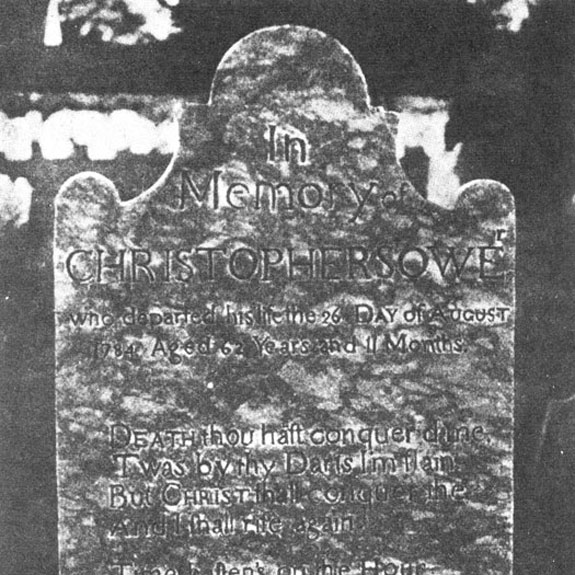August 26

The original headstone for Christopher Sower Jr. (1721-1784) from Martin Brumbaugh's 1899 "A History of The German Baptist Brethren" (page 427).
Of Christopher Sower, Jr. of Germantown, Pennsylvania, who died upon this day in 1784, the historian Isaiah Thomas said, “No medicines could be esteemed effectual, unless procured at Sower’s apothecary shop; no almanac, unless published by him, could be correct in time and weather; no newspaper promulgated truth but Christopher Sower’s German Gazette.”
Thomas might have added that “no type could be cast as effective for printing as that of Sower,” the Germantown printer being famed as the first American typefounder. Sower, born in Germany, was brought to the American colonies by his father in 1724. The elder Sower was a tailor, but during his early years in America he applied himself to some sixteen different trades, by all of which he could earn his living. He became a printer by accident when the equipment for a printing office was sent from Germany to Pennsylvania for the purpose of printing religious books. No printer was available to operate the press, so Sower took it over and became quite successful as a printer. He also learned how to make his own ink and paper.
Sower the younger became a bookbinder in his father’s establishment, taking over the shop at his father’s death in 1758. He acquired some of his father’s skills. He too could manufacture very fine ink, and he built a paper mill to produce both printing and writing paper in 1773. He even built his own presses. In order to maintain a certain amount of independence, Sower imported from Germany punches for the making of type. As his shop was producing German language printing, he needed a large supply of Fraktur type, obtainable only in Germany, and the cost of importing this type was a drain on his resources.
In the colophon of No. 12 of his religious periodical Ein Gesitliches Magazien, undated but probably appearing either late in 1771 or early 1772, appeared the notice, “Gedruckt mit der ersten Schrift die jemals in America gegossen worden.” (Printed with the first type ever cast in America.) Actually Abel Buell of Connecticut had cast type in 1769, but it received little use, while Sower’s was cast in quantity for the German bible which he was then engaged in printing.
Christopher Sower was sympathetic to the British cause and lost practically everything he owned during the long period of the Revolutionary War. He ended his life as a bookbinder and as a preacher of the gospel.